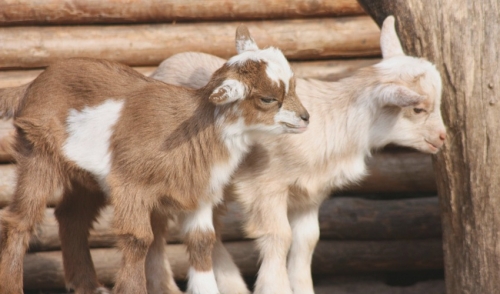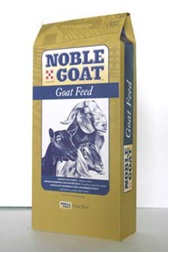
Healthy Does for Healthy Kids
The birth of healthy kids starts with healthy does. It goes without saying that breeding a doe that is in top condition will give you the best odds for producing strong, healthy kids. A good breeding program begins with good management and superior nutrition prior to breeding, during gestation and into lactation. Getting these key things right will give young kids a head start in reaching their full potential as adults. Following are some tips to guide you through these critical stages to achieve the end result we are all striving for, strong, healthy kids!
• A doe that is in ideal condition prior to being bred has a greater chance for breeding success. Following a good nutritional program that provides the proper balance of proteins, vitamins, minerals and other necessary nutrients will keep does healthy, reduce the chance for reproductive problems and support a healthy pregnancy following breeding.
• Gestation in goats lasts about 5 months, or 150 days. Once bred, the doe should eat as usual for the first 3 months of gestation. In the last 2 months, the developing fetus will put on a majority of its body weight, so the doe will need to increase the nutrition she is taking in. Space constraints due to the increasing size of the unborn kid may prevent her from consuming enough food to support herself and the fetus. You can help her to increase her energy intake at this time by providing smaller, more frequent meals and by increasing the concentrate (grain) portion of the diet while decreasing the forage portion. This change should be carried out gradually to prevent a rapid change in the rumen pH. More energy can also be supplied by adding a small amount of fat to the feed.
• A few days prior to kidding, behavioral clues will help to indicate the doe is soon to give birth. One of the first noticeable signs is a decrease in appetite. She may also become irritable, paw the ground, pace or become more vocal than usual. Once she gives birth, the kids should receive colostrum within the first 20-30 minutes of life. This thick, yellowish milk is rich in protein, minerals, Vitamin A and antibodies to provide nourishment and help protect the newborn kids from disease. It is important that kids receive colostrum for the first 3 days of life for the best chance of survival.
• After receiving colostrum for the first 3 days of life, kids that are to be bottle fed can start on Purina® Kid Milk Replacer which can be fed until weaning. This can be fed free choice or on a restricted basis. For best consumption, milk replacer should be at room temperature. Cold milk replacer does not go over well! Careful attention to mixing directions will prevent diarrhea or malnourishment due to incorrect preparation. Always clean and disinfect bottles and nipples after using to prevent diarrhea which can occur from bacterial growth on leftover milk residue.
• A high-quality 16% creep feed can be started when kids are between 6 and 8 weeks of age. Once they are consuming the creep feed, they can gradually be weaned off the milk replacer at 8-12 weeks of age. Young kids should continue to eat a quality ration and should gain between 0.15 to 0.5 pounds per day, depending upon breed. At this rate, kids will grow and develop properly and will achieve their full weight by breeding age, which is around 9 months of age.
• Does that are nursing their kids or providing milk for milk production will have much greater nutritional demands, so much so that they are often unable to eat enough to meet their requirements for lactation and have to rely upon their own body reserves. A high-quality complete and balanced goat ration or a diet made up of high-quality forage plus a supplement should be fed during this time.
• Young kids are very susceptible to the elements during the early spring and winter and need to be protected. In fact, pneumonia is thought to be the main cause of death in kids during the winter, so extra effort should be taken to prevent chilling and exposure. Supplying superior nutrition to kids will go a long way in helping them to survive their first winter and spring by keeping them healthy and strong.
The first year in the life of a goat is stressful. Within a year’s time, a kid is born and is expected to grow and develop into a young adult capable of reproducing their own young. A sound feeding program for does, in addition to good care and excellent management, will give newborn kids a jump start on reaching their full potential even before they are born. Kids that are strong and healthy at birth will have a better chance of getting through that first year to become productive adults.
Purina Mills®_ Noble Goat® Pre-Con Starter Grower 18
 • Complete and balanced diet with built-in roughage provides everything young kids need for optimum growth and development all in one feed
• Complete and balanced diet with built-in roughage provides everything young kids need for optimum growth and development all in one feed
• 18% high protein formula maximizes weight gain in young kids
• Easy to feed pellets provide consistent nutrition in every bite, eliminates sorting and reduces wasted feed
• Contains urinary acidifiers to reduce the formation of urinary calculi
• Addition of thiamine helps to promote stress tolerance in growing kids
• Contains Diamond V® Yeast Culture to maximize digestion of feed and promote stable rumen function during stress
• Available in medicated form to help prevent coccidiosis
